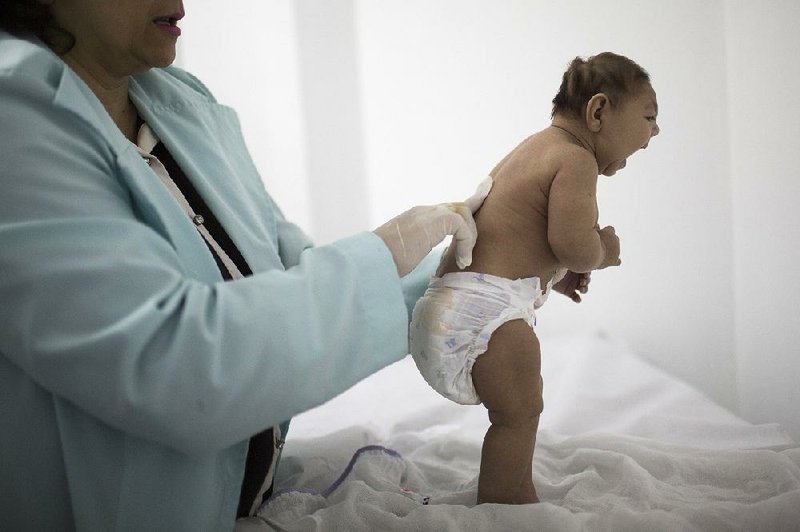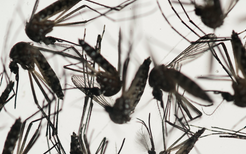NEW YORK -- U.S. health officials said Wednesday that there is no longer any doubt that the Zika virus causes babies to be born with abnormally small heads and other severe brain defects.
Since last year, doctors in Brazil have been linking Zika infections in pregnant women to a rise in newborns with microcephaly, or an unusually small skull. Most experts were cautious about drawing a firm connection, but now the U.S. Centers for Disease Control and Prevention says enough evidence is in.
"There is no longer any doubt that Zika causes microcephaly," CDC Director Dr. Tom Frieden said.
Among the evidence that clinched the case: Signs of the Zika virus, which is spread primarily through mosquito bites and can also be transmitted through sex, have been found in the brain tissue, spinal fluid and amniotic fluid of microcephalous babies.
The CDC and other health agencies have been operating for months on the assumption that Zika causes brain defects, and they have been warning pregnant women to use mosquito repellent, avoid travel to Zika-stricken regions and either abstain from sex or rely on condoms. Those guidelines will not change.
But the new finding should help officials make a more convincing case to the public for taking precautions. Some officials hope the Zika report will change public thinking about Zika the way the 1964 surgeon general's report convinced many Americans that smoking causes lung cancer.
"We've been very careful over the last few months to say, 'It's linked to, it's associated with.' We've been careful to say it's not the cause of," said the CDC's Dr. Sonja Rasmussen. "I think our messages will now be more direct."
The CDC announced its conclusion in a report published online by The New England Journal of Medicine.
The World Health Organization has made similar statements recently. A WHO official applauded the CDC report.
"We feel it's time to move from precautionary language to more forceful language to get people to take action," said Dr. Bruce Aylward, who is leading WHO's Zika response. "The purist will say that all the evidence isn't in yet, and they're right. But this is public health and we need to act."
Zika has been sweeping through Latin America and the Caribbean in recent months, and the fear is that it will get worse there and in the U.S. with the onset of mosquito season this spring and summer.
Public health authorities have called for aggressive mosquito-eradication efforts, including extensive spraying and campaigns to eliminate the sources of standing water in which mosquitoes breed. Those can include flower pots, swimming pool covers, discarded tires and pet water bowls.
The virus causes only a mild and brief illness, at worst, in most people. But in the past year, infections in pregnant women have been strongly linked to fetal deaths and devastating birth defects, mostly in Brazil, where the Health Ministry said Tuesday that 1,113 cases of microcephaly have been confirmed since October.
So far, there have been no documented Zika infections in the U.S. caught from mosquitoes. Nearly 350 illnesses in the 50 states were reported as of last week, all linked to travel to Zika outbreak regions.
The report comes at a time when health officials have been begging Congress to approve an emergency request for $1.9 billion in supplemental funding to fight Zika internationally and prepare in case mosquitoes spread the virus in the U.S. Earlier Wednesday, top House Republicans said they will probably grant a portion of that request, but probably not until September.
Appropriations Committee Chairman Harold Rogers, R-Ky., told reporters that "we're prepared to try to do a supplemental bill if it's needed" and that action is likely "before the end of the fiscal year" on Oct. 1. At a hearing later, he acknowledged for the first time that the panel is working on a supplemental spending measure but said he wants more details to supplement the administration's request, which he said is "almost a slush fund."
Another senior Republican said additional Zika money most likely wouldn't come before September.
"We're certainly fine probably through the end of the fiscal year, so it's not like we have to do something today," said Rep. Tom Cole, R-Okla., chairman of the House panel responsible for the Centers for Disease Control and Prevention and the National Institutes of Health. "But we do need to do something in the foreseeable future, and I would think before the end of the fiscal year," perhaps as an attachment to a must-pass stopgap funding bill that's required to prevent a government shutdown in October.
House Speaker Paul Ryan, R-Wis., said Wednesday that the House "will address this situation through the regular appropriations process as the need arises, and our appropriators are looking at how to do just that."
Information for this article was contributed by Maria Cheng and Andrew Taylor of The Associated Press.
A Section on 04/14/2016


